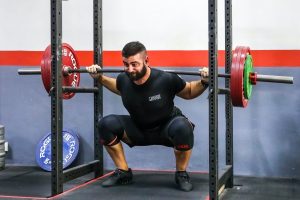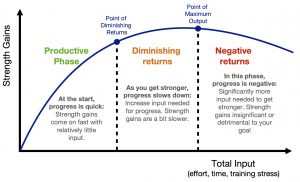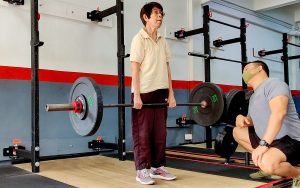For the longest time, we’ve been going on about the virtues of strength training. We’ve talked about the importance of strength, why you should get strong first, and why strength training is your best investment at a gym.
So aiming for strength is great. But is there such a thing as being too strong? Can one actually be too strong? Without being clear WHY you’re training for strength, you might lose track of why you started training in the first place. And then end up undermining your real goals or negatively affecting your lifestyle.
Strength training will improve sports performance
If you’re an athlete who wants to get better at your chosen sport, barbell training will increase your total body strength. Regardless of the sport, you’ll benefit from the increase in strength because you’ll increase your ability to produce force in your sport-specific motions. For a tennis player, it means more power in your forehand; for a golfer, the increased strength allows you to hit the ball further with less effort, improving your accuracy.
Let’s look at Ben. He’s a cyclist and regularly participates in road bicycle races. Contrary to popular opinion, even endurance sports like cycling can benefit from strength. While Ben is pretty fit aerobically, he’s isn’t too strong and can sometimes struggle when it comes to uphill cycling.
His goal is to get stronger, in order to improve his overall cycling efficiency. So he starts strength training.
Ben cycles 3-4 times a week. Because of his tight schedule, he’s only able to dedicate 2 sessions per week to barbell strength training. The Novice Linear Progression (NLP) calls for 3 training sessions per week. But no biggie, Ben can still make good progress training twice a week, albeit a little slower.
He embarks on the NLP. At first, the weights are light and all’s easy. Cool. After a couple of months, the weights start to feel a little heavy, but still quite manageable. It’s all pretty typical for someone on the Starting Strength NLP.
But the difference in sports performance can be dramatic. After about two months or so of strength training, Ben realises that he doesn’t get as tired so easily. He has much more power to propel himself up hills and he surprises himself with a personal best time. Sweet.
But the stronger you get, the more it takes
Ben is now a total believer in strength training. He ups the ante, and increases his strength sessions from 2 to 3 days a week, sometimes doubling up with his sports training days.
But just another couple of months down this road, the weights start to feel really heavy. Ben’s sessions are getting tougher and starting to take longer. He feels more fatigued. So much so that the last time he cycled, his legs felt like there were sandbags tied to them and he just didn’t have the energy.
What happened?
There’s this little law about training that Ben didn’t consider – The stronger you get, the more effort it takes for you to get even stronger. Because more training stress is needed for you to keep progressing.
This translates to more time spent training, and more energy put into imposing training stress to drive strength adaptations.
But recovery and time are finite resources. Unlike professional athletes, whose only job is to train, eat and sleep, Ben is an everyday person like you and me. Ben has a job and family commitments. If Ben is doing both (intensive) sports training and strength training for most days of the week, he’s most likely not sufficiently recovered from the training sessions.
Unless you’re a strength athlete, you don’t need to train like one
Some people think that when we recommend them to get stronger through barbell strength training, we want them to become powerlifters and dedicate themselves to the sole purpose of lifting as much weight as possible.
That’s not true at all. If you’re an athlete, strength training should be a way for you to improve your performance.
As an endurance athlete, will getting Ben’s squat to 200kgs help him in his cycling? Very unlikely. If you’re naturally strong and can squat 200kgs without training, then yes, that strength will be beneficial to your cycling. However, these genetically gifted people are extremely rare and it’s very unlikely that you’re one of them. So, to get your squat up to 200kgs means you’ve got to train quite a bit to get there. If you’re spending too much time and effort driving up the numbers of your lifts, to the point where it interferes with your performance, that’s defeating the purpose.
Diminishing returns: when the extra effort isn’t worth it
Take a look at the graph. At first, your performance increases as your strength increases. So far so good.
But as you get stronger, you’ll eventually hit the point of diminishing returns – the amount of time and effort you have to put into getting even stronger will vastly outweigh the tiny increment (if any) in your sport performance.
Once you’re at that stage, you’re already strong enough for your goals. Getting even stronger doesn’t make sense and is counterproductive, because you’ll be trading high effort for low (or negative) returns.
But let’s say you’re stubborn. You think it’s just a training plateau and you want to push past it. So you double down on the effort. Here’s where the process of getting even stronger will actually be detrimental to your performance.
Here’s where Ben got stuck. He stopped getting stronger. His sports performance got worse, unfortunately reinforcing the stereotype that barbell strength training doesn’t help cyclists.
Getting strong for “situational intermediate” athletes
Unless your sport relies heavily on strength and power, getting super strong will not be a priority for you. And even if it does, you can always work towards getting stronger in the off season and maintain as much strength as possible during the on season. This ensures that you have enough time for recovery and also to take the strength acquired and apply to your sport with sport specific practice.
If strength isn’t your top priority, you’ll be what we call a “situational intermediate”. Your needs and situation requires that your training advancement be only at the intermediate stage.
More than that isn’t advisable. Because advancing in your strength training would require time and energy resources that you can’t afford, since your ultimate goal is to improve sports performance.
Ben, before he burnt out by overtraining, would have been a situational intermediate athlete.
Getting strong for regular fitness and health
How about regular people who don’t have a performance goal?
Meet Cathy, a lady in her 70s that wants to beat osteoporosis, who knows that strength is one of the best ways to prevent falls. For someone like her, having strength and bone mass is like savings in a bank – the more, the better.
Still, Cathy’s goals are quite different from Ben’s. She’s older, and wants to be strong because it keeps her muscles from atrophying, thus directly improving her mobility and quality of life.
Cathy got into strength training for health reasons, but found to her surprise that she loves the process of barbell training. She loves the rigour of the training routine, and how good she feels after. Cathy’s quite competitive, and enjoys seeing her numbers go up. Coming into the gym is now Cathy’s hobby – not only is she getting stronger and healthier, she’s also enjoying the pleasure of improving each time.
What’s your goal?
As coaches, we all love our lifters to be as strong as they can be. However, your goals takes precedence over what we might have in mind. How strong you need to be all boils down to your goals and how much time and effort are you willing to put in to achieve those goals.
For Ben, it’s sports performance. So he needs to optimise his time and energy resources, to maximise his strength gains without affecting his sport. Impatience or unsustainable approaches to strength training will not do him good in the long run.
For Cathy, it’s health and feeling physically great. She needs to do regular workouts with guidance on how to increase her muscle and bone mass. While she does want to get as strong as possible to preserve her quality of life, she needs to consider whether or not the additional increase in time and effort spent getting even stronger past a certain point will have a correlation to an increase in health. However, if Cathy enjoys training to the point whereby she starts to join competitions, then her perspective on training will have to change to an extent.
Know yourself. Be strategic about your strength training
So how much strength is sufficient? Ignore the definitions of strength, and ignore what other people say. Love training, want to be as strong as possible and lift as much as much as you can? That’s cool. Happy with maintaining a certain level of strength because that’s all that’s needed to achieve your goals? That’s cool too. Know why YOU want to be strong. If you’re not sure, think about why you started strength training in the first place.
When you keep your goal in mind, you’ll unconsciously always be asking: does the cost of getting even stronger outstrip the benefit of the goal I’m working towards?
If you can do that, you’ll be on the right track.
Not quite clear what your goal is, and whether or not you’re progressing? We can work with you. Talk to us to get clarity, to optimise your training, and to make the most efficient strength gains.





